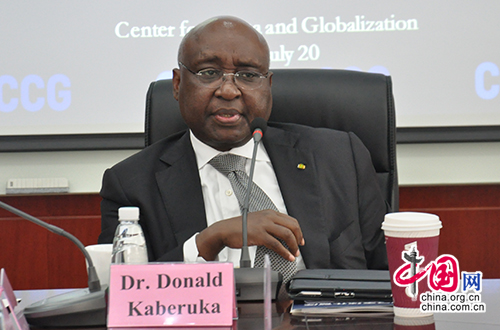AfDB president looks to cooperate with AIIB
- By Zhang Rui
 0 Comment(s)
0 Comment(s) Print
Print E-mail China.org.cn, July 20, 2015
E-mail China.org.cn, July 20, 2015
African Development Bank (AfDB) President Donald Kaberuka said he expects to "work together" with the Asian Infrastructure Investment Bank (AIIB) to develop African infrastructure.
|
|
|
African Development Bank President Donald Kaberuka speaks at a seminar hosted by the Center for China and Globalization, a Chinese think tank, in Beijing on July 20, 2015. [China.org.cn] |
"I sense that the AIIB would be a game changer in international financial architecture," Kaberuka said while attending a Beijing seminar hosted by the Center for China and Globalization, a Chinese think tank.
Kaberuka said there is an estimated annual infrastructure funding gap of US$50 billion dollars in Africa for now."We should work with the AIIB closely, ensuring the money being put into the right place," said Kaberuka.
He believes that the AIIB will provide a new source of development funding to meet the increasing needs of countries around the world.
In early July, multilateral development banks including the World Bank, the AfDB and the International Monetary Fund said in a joint statement that infrastructure investment needs alone reach as high as US$1.5 trillion a year in emerging and developing countries.
The AIIB is designed to finance infrastructure construction and has authorized capital of US$100 billion. Only two countries on the continent of Africa – South Africa and Egypt – were among the 57 prospective founders that signed the AIIB charter on July 1.
Kaberuka also noted that China and Africa have a long history of sound collaboration.
The AfDB, founded in 1964, has 53 African member countries and 24 non-African member countries and is the biggest regional development financial institution. China joined the AfDB in 1985. In 2014, the People's Bank of China and the AfDB signed a agreement establishing a US$2-billion co-financed fund known as the Africa Growing Together Fund, which serves alongside the AfDB's own resources to finance eligible nationally-backed and non-nationally-backed development projects in Africa.
China has become the biggest state-level investor in Africa. Chinese Premier Li Keqiang previously said China's direct investment in Africa will reach US$100 billion by 2020.
Kaberuka added that China's economy has grown steadily for three decades and that its people's lives and incomes have subsequently improved. He also acknowledged the transfer of excess manufacturing productivity from China to Africa, while pointing out that 26 African countries have signed free trade deals. He asserted that African-made products will have much greater prospects as a result of such deals, encouraging China's manufacturing industry to further develop in Africa.







Go to Forum >>0 Comment(s)